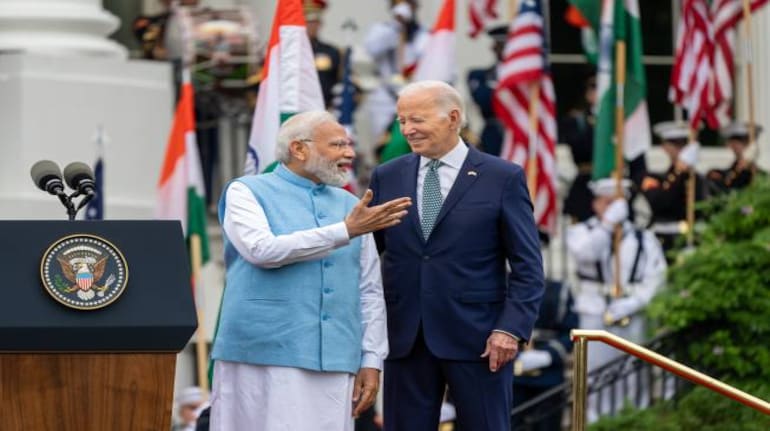



The India-Middle East-Europe Corridor (IMER) multinational rail and shipping project announced last week on the G20 summit’s sidelines could pose a serious challenge to China’s Belt and Road Initiative (BRI).
The ambitious infrastructure project, which would link India with West Asia and Europe, could boost India’s economic integration with the Gulf and other countries in the region and Europe.
Prime Minister Narendra Modi and US President Joe Biden co-chaired a special event on Partnership for Global Infrastructure and Investment (PGII) and the India-Middle East-Europe Economic Corridor (IMEC), on September 9, in New Delhi.
IMEC is under the Partnership for Global Infrastructure and Investment, which is a collaborative effort by the Group of Seven (the world’s seven richest economies) to fund infrastructure projects in developing nations.
In a post on social media, Prime Minister Modi said, “As history unfolds, may this corridor be a testament to human endeavour and unity across continents.”
A memorandum of understanding on the IMEC was signed by India, the US, Saudi Arabia, the UAE, the European Union, Italy, France and Germany.
The project was unveiled in the presence of Prime Minister Modi, President Biden, Saudi Arabian Crown Prince Mohammed Bin Salman, and other European leaders.
The announcement of the new project comes at a time when China’s infrastructure-focused initiative BRI is losing steam in the wake of a domestic economic slowdown and surging defaults triggered by the COVID-19 pandemic.
Modi described the IMEC as a beacon of cooperation and innovation that charts a journey of shared aspirations and dreams, noting, “We are sowing the seeds for future generations to dream bigger.”
The US President added, “This is a big deal. This is a really big deal.” Biden said the pact would unlock “endless opportunities” for clean energy, clean electricity, and laying cable to connect communities.
What it links
The corridor aims to link Middle Eastern countries by rail and connect them to India by port, helping the flow of energy and trade from the Gulf to Europe by cutting shipping times, costs and fuel use.
The corridor, which would include India, Saudi Arabia, the United Arab Emirates, Jordan, Israel and the European Union, would help boost trade, deliver energy resources and improve digital connectivity.
The IMEC comprises an Eastern Corridor connecting India to the Gulf region and a Northern Corridor connecting the Gulf region to Europe. It will include a railway and ship-rail transit network and road transport routes.
“We believe that connectivity is a means to not only increase mutual trade between different countries but also increase mutual trust,” said Modi.
According to experts, the proposed project will cut the trade time between India and Europe by 40 percent.
Many observers also see it as an initiative to counter China’s BRI, which aims to connect Asia, Africa and Europe. They said Biden is looking to counter China’s Belt and Road push on global infrastructure by pitching Washington as an alternative partner and investor for developing countries in the G20 grouping.
US and European officials hailed the announcement as a game-changer.
Saudi Arabia’s Crown Prince Mohammed bin Salman felt the new project would include pipelines for electricity, hydrogen and railways and would contribute to international energy security.
The deal will benefit low- and middle-income countries in the region, and enable a critical role for the Middle East in global commerce,
The Saudi Crown Prince announced his country’s participation with a contribution of $20 billion.
Germany too is supportive. “We have to ensure that we implement (the corridor) successfully and Germany is committed to contribute in that regard,” said German Chancellor Olaf Scholz.
China to host BRI summit
Meanwhile, China has announced that it will host a BRI summit in Beijing in October; 90 countries have already confirmed their participation.
In September 2013, Chinese President Xi Jinping outlined his vision for a Silk Road Economic Belt connecting China and Europe.
More than 150 countries have since signed memorandums of understanding with China for cooperation on investments.
China's trade with Belt and Road countries has grown 76% from 2013 to 2022, according to Chinese officials.
Stronger economic ties with emerging countries also bolstered China's clout on the international stage and have kept it from being isolated by US-led efforts within the United Nations.
But the steady trade deficit of other countries in the BRI with China has led to a re-think on whether to continue with the Chinese initiative. For instance, Italy, the only G7 country to join the BRI (in 2019), found that its trade deficit had doubled in three years through 2022.
Tough Chinese conditions on financing have also led to problems and many countries are struggling to repay their debt.
The Chinese leadership’s decision to write off debts of African countries saw the internet flooded with posts asking the government to do the same for medical expenses and mortgages for Chinese people at home.
After the announcement of the IMEC, the October BRI summit will be keenly watched in China and beyond for the Chinese President’s reaction.
Discover the latest Business News, Sensex, and Nifty updates. Obtain Personal Finance insights, tax queries, and expert opinions on Moneycontrol or download the Moneycontrol App to stay updated!
Find the best of Al News in one place, specially curated for you every weekend.
Stay on top of the latest tech trends and biggest startup news.